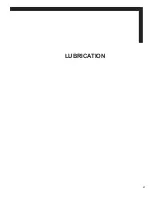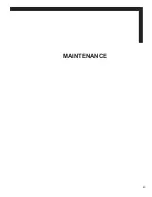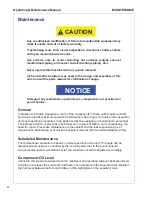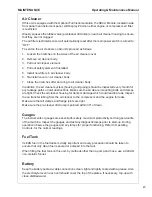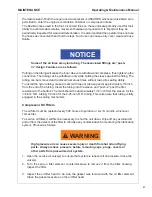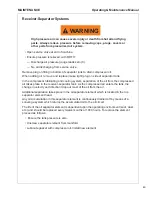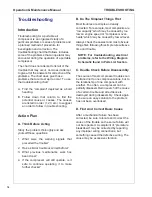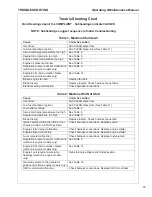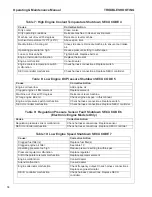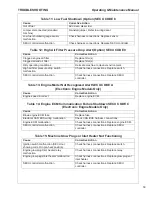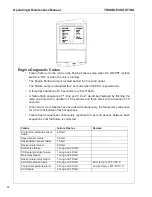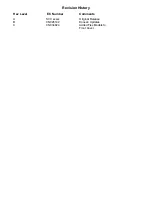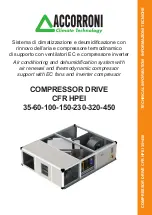
Operation & Maintenance Manual
TROUBLESHOOTING
54
Troubleshooting
Introduction
Troubleshooting for a portable air
compressor is an organized study of a
particular problem or series of problems and
a planned method of procedure for
investigation and correction. The
troubleshooting chart that follows includes
some of the problems that an operator may
encounter during the operation of a portable
compressor.
The chart does not attempt to list all of the
troubles that may occur, nor does it attempt
to give all of the answers for correction of the
problems. The chart does give those
problems that are most apt to occur. To use
the troubleshooting chart:
A. Find the “complaint” depicted as a bold
heading.
B. Follow down that column to find the
potential cause or causes. The causes
are listed in order (1,2,3 etc.) to suggest
an order to follow in trouble shooting.
Action Plan
A. Think Before Acting
Study the problem thoroughly and ask
yourself these questions:
1. What were the warning signals that
preceded the trouble?
2. Has a similar trouble occurred before?
3. What previous maintenance work has
been done?
4. If the compressor will still operate, is it
safe to continue operating it to make
further checks?
B. Do The Simplest Things First
Most troubles are simple and easily
corrected. For example, most complaints are
“low capacity” which may be caused by too
low an engine speed or “compressor over-
heats” which may be caused by low oil level.
Always check the easiest and most obvious
things first; following this simple rule will save
time and trouble.
NOTE: For troubleshooting electrical
problems, refer to the Wiring Diagram
Schematic found in Parts List Section.
C. Double Check Before Disassembly
The source of most compressor troubles can
be traced not to one component alone, but to
the relationship of one component with
another. Too often, a compressor can be
partially disassembled in search of the cause
of a certain trouble and all evidence is
destroyed during disassembly. Check again
to be sure an easy solution to the problem
has not been overlooked.
D. Find And Correct Basic Cause
After a mechanical failure has been
corrected, be sure to locate and correct the
cause of the trouble so the same failure will
not be repeated. A complaint of “premature
breakdown” may be corrected by repairing
any improper wiring connections, but
something caused the defective wiring. The
cause may be excessive vibration.
Summary of Contents for D82
Page 2: ...2...
Page 5: ...3 FOREWORD...
Page 8: ...Operation Maintenance Manual FOREWORD 6...
Page 9: ...7 DRAWBAR NOTICE...
Page 11: ...DRAWBAR NOTICE Operating Maintenance Manual 9...
Page 12: ...Operating Maintenance Manual DRAWBAR NOTICE 10...
Page 13: ...11 SAFETY...
Page 16: ...Operating Maintenance Manual SAFETY 14...
Page 18: ...Operating Maintenance Manual SAFETY 16...
Page 19: ...SAFETY Operating Maintenance Manual 17...
Page 21: ...SAFETY Operating Maintenance Manual 19...
Page 23: ...21 NOISE EMISSION...
Page 29: ...27 GENERAL DATA...
Page 32: ...Operating Maintenance Manual GENERAL DATA 30...
Page 33: ...31 OPERATION...
Page 43: ...41 LUBRICATION...
Page 45: ...43 MAINTENANCE...
Page 55: ...53 TROUBLESHOOTING...


